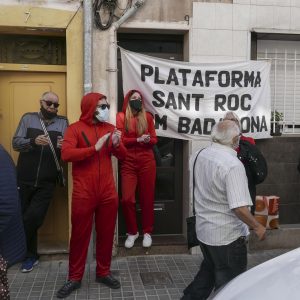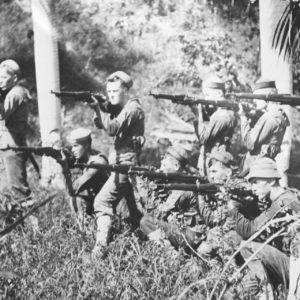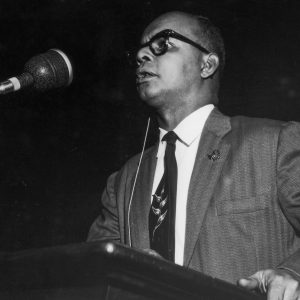Catalonia’s status continues to divide Spain
There is little hope for settling the age-old conflict, despite recent moves to resume talks between the Spanish and Catalan governments over the future of the region.
Author:
28 September 2021

Painted on lamp posts and walls, or tacked to jacket lapels or even face masks, yellow ribbons were omnipresent throughout Spain’s northeastern region of Catalonia in recent years. They served as a symbol of solidarity with nine pro-independence leaders from this autonomous community who were imprisoned late in 2017 as a result of Catalonia’s failed bid for secession from Spain.
Released from prison in June this year after the Spanish government pardoned them, the seven men and two women had been considered the last “political prisoners” of western Europe by the pro-independence movement. The reprieve was meant to soothe tensions in society, but the conflict is far from over.
It first flared up in October 2017 when the ruling separatists in the Catalan parliament declared independence after a referendum on self-determination that was declared illegal by the Spanish Constitutional Court. No country recognised the move and the Spanish government temporarily suspended self-rule in Catalonia, which has 7.7 million inhabitants and its own national identity.
Related article:
A number of Catalan officials left for exile, including former president Carles Puigdemont, while others such as his deputy, Oriol Junqueras, decided to stay. In total, seven members of parliament and two activists were found guilty of sedition and, in 2019, received harsh sentences of between nine and 13 years in prison.
Asked whether the arrested Catalan pro-independence leaders could have been considered political prisoners, Adriana Ribas, coordinator and spokesperson of Amnesty International’s branch in Catalonia, replied that “there is no international definition of that concept, so we have stopped using it”.
Criminalising political protest
Instead, Amnesty International’s campaigns in Catalonia had focused on political activists Jordi Sànchez and Jordi Cuixart, who were preventively jailed in October 2017 for organising a protest the previous month. They “should never have ended up in prison for peaceful disobedience”, said Ribas, adding that their conviction and nine-year sentence for sedition opened the door to criminalising all types of street protests.
Cuixart is the president of Òmnium Cultural, an organisation created 60 years ago to defend the Catalan identity. It has 183 000 members, many more than any political party in Spain, and openly supports independence. The director of its international relations department, Elena Jiménez Botías, contends that Cuixart was jailed for his ideology. “As president of Òmnium, he is the symbol of a cause. He was jailed for taking a leading role in a peaceful protest that, in fact, started spontaneously.”

All the pro-independence leaders were tried by the Supreme Court of Spain, which is widely seen as biased in Catalonia. “We don’t say that Spain is an authoritarian country like Turkey, but some courts – not all – are clearly politicised,” said Jiménez, who emphasises that law reform is needed.
Her view is supported by the Council of Europe’s parliamentary assembly, which issued a statement on 21 June on its resolution that Spain should “reform the criminal provisions on rebellion and sedition in such a way that they cannot be interpreted so as to undo the decriminalisation of the organisation of an illegal referendum, intended by the legislature when it abolished this specific crime in 2005, or lead to disproportionate sanctions for non-violent transgressions”.
Severe blows to the Spanish government have also come from European countries where the exiled Catalan leaders live. German, Belgian, Swiss and Scottish judges have rejected all extradition requests, which is unusual among European nations.
Anti-independence views
Àlex Ramos, vice-president of the Societat Civil Catalana (Catalan Civil Society), a Barcelona-based organisation that promotes the region’s union with Spain, does not believe the Catalan leaders have been persecuted for their ideology. “Being in office, they breached the legal system and that’s the reason they were tried,” he said.
On 8 October 2017, a week after the referendum, the society gathered a great mass of people in Barcelona for a rally against Catalan independence. According to the organisers and the Spanish government, it was attended by over a million people, though the Barcelona police estimated it to be 350 000. To date, this is the largest pro-Spain unity demonstration in the history of Catalonia.
The 2017 clashes over the self-determination referendum are the latest chapter in a centuries-long history of conflictual relations between Spain and Catalonia. Catalans, who speak a language different to Spanish and have their own civil codes, celebrate their national day on 11 September when, in 1714, Catalonia lost a war and its sovereignty, becoming an integral part of Spain.
Related article:
The Catalan language and identity were repressed during different periods, but most harshly during Francisco Franco’s dictatorship from 1939 to 1975. Pro-independence parties obtained a small majority in the Catalan parliament only a decade ago, after the Constitutional Court of Spain struck down a new law that would have conceded more powers to Catalonia. According to polls, Catalans are split in half on the matter of independence.
The Spanish government is adamant that pardoning the Catalan leaders will change the dynamic of the conflict. “The pardon is a resounding message that we want to rely on everyone. We need to join forces to put a bad past behind us and build a better future,” Prime Minister Pedro Sánchez told his Spanish Socialist Workers’ Party in July.
Anger over pardons
But the pardons provoked a political firestorm in Spain. Pablo Casado, the leader of the People’s Party, asked the prime minister to resign and accused him of “treason” and “selling Spain in an auction”. He argued that Sánchez gave the pardons in exchange for Catalan parties supporting his minority government. The conservative opposition gathered thousands of signatures against the measure.
Ramos says the Societat Civil Catalana also does not want the government to negotiate with secessionist parties. “They need the support of the pro-independence parties in Congress, and they don’t listen to those in Catalonia who aren’t nationalists,” he said.
He argues that the separatists do a good job selling an image of being victims oppressed by the Spanish state. “Those of us who are victims are the Catalans who feel Spanish,” Ramos said. “We are helpless. We are truly harmed and invisible in the eyes of the Catalan and Spanish governments.”

The so-called table of dialogue between the Spanish and Catalan governments convened in mid-September in Barcelona with the aim of resolving the conflict through negotiations. Pere Aragonès, the president of Catalonia, said earlier that his government would present “two demands that may solve the conflict and which are supported by an overwhelming majority of Catalans: the amnesty and a referendum of independence”.
By “amnesty” Aragonès meant a pardon for all the other pro-independence activists who are still being prosecuted in Spanish courts. However, Sánchez has already warned that he won’t even discuss these two proposals, which he deems contrary to the Constitution.
The Societat Civil Catalana does not support a referendum either, saying it would “mean the victory of half of Catalonia over the other half”, said Ramos. Nonetheless, the idea of a referendum enjoys the support of more than 70% of Catalans, according to polls.
A failure of politics
Josep Ramoneda, a Catalan journalist, describes the conflict since 2017 as a “failure of Spanish politics” and blames former prime minister Mariano Rajoy, who was in office from 2011 to 2018. “He had opportunities to seek a political way to resolve the conflict. Taking it to court has only worsened the Spanish political situation,” said Ramoneda.
He acknowledges that the independence movement made a major mistake when it tried to declare independence when there was no possibility of it happening. “We are in a hangover period since the events of 2017,” he says. “The pardon has helped a certain [easing of tension] in society. Now we must come back to politics without fear.”
Related article:
Since getting out of prison, Cuixart has repeatedly said “we will do it again”, striking a defiant note that has not sat well with Madrid. The “table of dialogue” seems poised to fail, with radicals on both sides pushing mainstream parties to reject any concessions – all of which means there’s no end in sight for the so-called Catalan conflict.



